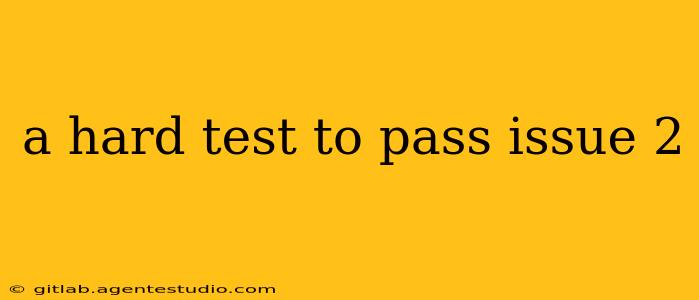A Hard Test to Pass: Issue #2 - Tackling the Challenges Head-On
Passing a difficult test often hinges on more than just knowledge; it requires strategic preparation, effective study techniques, and a resilient mindset. Issue #2, whatever its specific context (academic exams, professional certifications, or even life's challenges), presents a unique set of hurdles. This article delves into the common problems encountered when facing a particularly tough test and offers practical solutions to overcome them.
Identifying the Root of the Problem: What Makes This Test So Hard?
Before diving into solutions, we must first understand the source of the difficulty. Is it the sheer volume of material? The complexity of the concepts? A lack of confidence? Or perhaps a combination of factors? Pinpointing the specific challenges allows for targeted preparation. For instance:
-
Overwhelming Amount of Information: If the sheer volume of material is daunting, breaking it down into manageable chunks is crucial. Utilize techniques like spaced repetition and active recall to improve retention.
-
Complex Concepts: If the concepts are difficult to grasp, seeking clarification from instructors, tutors, or online resources is essential. Don't hesitate to ask questions; understanding the fundamentals is key to tackling more advanced topics.
-
Lack of Confidence: Negative self-talk can be a significant barrier. Building confidence involves setting realistic goals, celebrating small victories, and focusing on progress rather than perfection. Positive affirmations and visualization techniques can also prove beneficial.
-
Poor Test-Taking Strategies: Even with a strong understanding of the material, poor test-taking strategies can lead to failure. Practice timed tests to improve speed and accuracy, and learn effective strategies for managing test anxiety.
Strategies for Conquering the Challenge
Once you've identified the root causes, implement these strategies:
-
Develop a Robust Study Plan: Create a detailed study schedule that allocates sufficient time for each topic, ensuring regular review sessions. Don't cram; consistent, focused study is far more effective.
-
Active Recall Techniques: Instead of passively rereading notes, actively test your knowledge. Use flashcards, practice questions, and teach the material to someone else to solidify your understanding.
-
Seek External Support: Don't be afraid to ask for help. Utilize tutoring services, study groups, or online forums to clarify doubts and gain different perspectives.
-
Practice, Practice, Practice: The more you practice, the more comfortable you'll become with the test format and the material. This also helps identify areas where you need further improvement.
-
Mindfulness and Stress Management: Test anxiety can significantly impact performance. Practice relaxation techniques like deep breathing, meditation, or yoga to manage stress and improve focus.
Beyond the Test: Cultivating a Growth Mindset
Passing a hard test is not just about achieving a specific outcome; it's about developing a resilient mindset and a growth-oriented approach to learning. Embrace challenges as opportunities for growth, and remember that setbacks are inevitable but not insurmountable. Focus on continuous improvement and learning from your mistakes. This perspective will not only help you overcome this particular test but also equip you for future challenges.
This approach to tackling a difficult test goes beyond rote memorization and emphasizes a holistic strategy encompassing mental preparedness, effective study techniques, and a belief in your ability to succeed. Remember, consistent effort, strategic planning, and self-belief are the keys to overcoming Issue #2 and achieving your goals.

